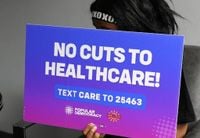As the government shutdown stretched into its ninth day this October, the nation found itself ensnared in a bitter standoff that’s as much about health care as it is about budgets and brinkmanship. At the heart of the deadlock: the fate of Affordable Care Act (ACA) subsidies, a lifeline for millions of Americans facing the prospect of soaring health insurance premiums next year unless Congress acts soon. The drama—unfolding in Washington and reverberating across the country—has exposed deep partisan divides, galvanized young activists, and left federal workers and ordinary families caught in the crossfire.
On October 9, 2025, House Speaker Mike Johnson stood before the press, flanked by fellow Republicans, to address what has become his now-daily shutdown briefing. The message, however, offered little in the way of new solutions. Pressed on the GOP’s lack of a concrete plan to guarantee funding for ACA subsidies, Johnson admitted, “It’s about keeping Congress operating so we can get to health care. We always were going to. They’re lying to you. Okay. The health care issues were always going to be something discussed and deliberated and contemplated and debated in October, November. It always was.” According to reporting from NBC News, Johnson insisted that the December 31 policy deadline for ACA subsidies was unrelated to the government’s fiscal cliff at the end of September, when the shutdown began.
Yet for millions of Americans, the distinction between political timelines and real-world consequences is academic at best. Insurers have already begun mailing notices of upcoming rate hikes, warning that premiums could double—or worse—if Congress fails to extend the enhanced subsidies that have been in place since the pandemic. As NBC News detailed, these subsidies benefit about 24 million people, with 92% receiving enhanced tax credits first passed in the 2021 Covid-19 relief bill. The prospect of losing these credits, and with them affordable coverage, has become a rallying cry for Democrats, who have made restoring the subsidies their central demand in the shutdown negotiations.
“Voters continue to blame Trump and Republicans more than Democrats for the shutdown,” read a memo from pollster Geoff Garin to Senate Democratic communications directors, as reported by NBC News. Polling data backs this up: 78% of U.S. adults favor extending the ACA subsidies, compared to just 22% who think they should expire. Even among so-called "MAGA supporters," a majority—57%—support keeping the subsidies in place. This public sentiment has emboldened Democratic leaders, who have refused to support any temporary funding deal that doesn’t include an extension of the subsidies.
Republican leaders, meanwhile, have remained steadfast in their position that Democrats must first vote to reopen the government before any serious discussion on health care funding can proceed. Senate Majority Leader John Thune has referred to the subsidies as "Covid subsidies" that were always meant to be temporary, and has called for new restrictions if any extension is to be considered. Speaker Johnson echoed this sentiment at his Thursday press conference: “Democrats seem to be doing everything except the one thing that Americans desperately need and deserve. And that’s passing our clean CR to get the government operating again. That’s all we’re asking. Stop the political stunts. Stop the madness. Stop saying that you’re enjoying inflicting pain on the American people for goodness sakes. And pass the clean CR and end the shutdown today.”
But the standoff is not confined to the marble halls of Congress. On October 8, a group of young activists gathered outside Speaker Johnson’s district office in Bossier City, Louisiana, demanding that Congress protect the ACA and Medicaid. Organized by Step Up Louisiana and Popular Democracy in Action, the protest drew students like 13-year-old Nyla Joseph, who voiced her concerns about the rising cost of health care and the impact of inflation on her future. “I gotta live here too. I gotta live and breathe like everybody else, and when I get older, I gotta get a job, get healthcare, and do all these other things, and with inflation going up, it’s gonna be hard to pay for healthcare and live life,” Nyla told KTAL/KMSS.
The students’ activism is emblematic of a broader trend: youth engagement in civic issues has surged in recent years, with voter turnout among 18- to 29-year-olds reaching historic highs in the last two national elections. Nyla’s message to her peers was clear: “You’re getting older, you’re not going backward. You’re not gonna get younger, you’re gonna get older. So you gotta learn stuff now so you don’t have to learn it later. If you learn about healthcare, inflation, and get all that stuff ready now you’re not gonna have to do it later. You’re not gonna have setbacks. Be two steps ahead of the game.”
Back in Washington, the political temperature continued to rise. NBC News reported that on October 9, the Senate took its seventh vote on competing government funding bills—one from each party—with no senators changing their positions. Republicans still need five more Democratic votes to break a filibuster and pass their temporary funding bill, but Democrats are standing firm, buoyed by public opinion and the visible pain caused by the shutdown. Federal workers, including members of the military, are now working without pay, and the prospect of missed paychecks looms large as the shutdown threatens to become the seventh-longest in U.S. history.
The stakes are not lost on lawmakers facing tough re-election fights. Representatives like Jen Kiggans of Virginia, whose district includes a large military population, have called on Speaker Johnson to reconvene the House and vote on her Pay Our Troops Act. “Military pay should not be held hostage due to Washington’s dysfunction!” Kiggans wrote on X, formerly Twitter. Even some Republicans who have been loyal to former President Trump, such as Rep. Marjorie Taylor Greene, have broken ranks to demand the extension of Obamacare subsidies, according to Salon’s coverage.
The roots of the current impasse run deep. Since Donald Trump’s first presidential campaign in 2015, Republicans have repeatedly promised to repeal and replace the ACA with “such great health care, at a tiny fraction of the cost.” Yet, as Salon notes, a decade of such promises has failed to yield a viable alternative, and the GOP’s only consistent action has been to try to undermine the ACA’s protections. The latest iteration of this effort, according to reporting, involves letting the subsidies lapse and pushing for policies that would privatize Medicare, deregulate insurance, and open the door to junk plans with little real coverage.
For many Americans, the consequences of these policy choices are immediate and personal. As the shutdown drags on, more families are receiving letters warning of premium hikes, and uncertainty over health coverage grows. The battle lines are drawn not just over budgets or ideology, but over the tangible impact on people’s lives—whether they can afford to see a doctor, fill a prescription, or keep their families healthy.
With no end to the shutdown in sight, and both parties digging in on the issue of health care funding, the coming weeks may prove decisive. For now, the American public waits—watching, worrying, and, in some cases, taking to the streets to demand answers from those in power.


